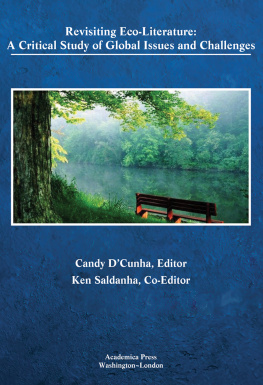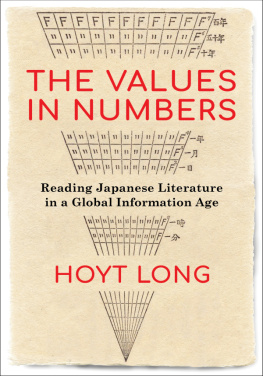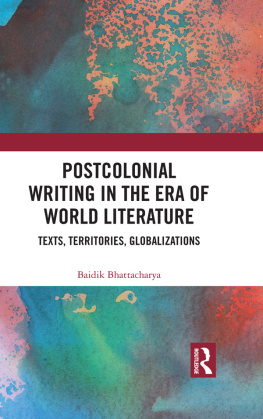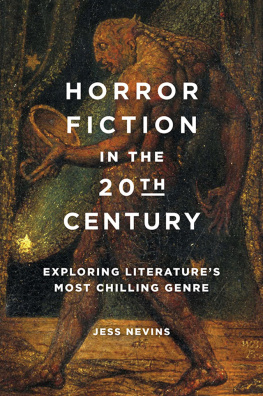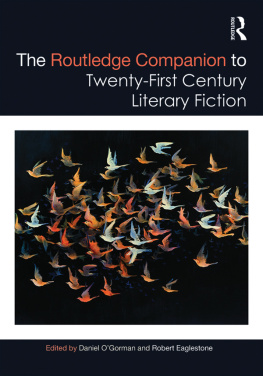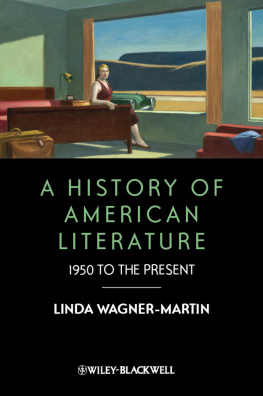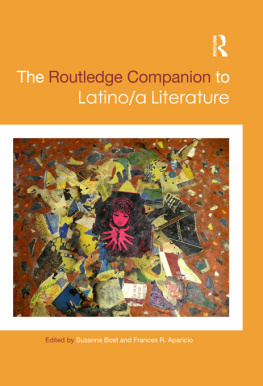Contents
Page List
Guide
Revisiting Eco-Literature: A Critical Study of Global Issues and Challenges
Candy DCunha, Editor
Ken Saldanha, Co-Editor
Revisiting Eco-Literature: A Critical Study of Global Issues and Challenges
Candy DCunha, Editor
Ken Saldanha, Co-Editor
Academica Press
Washington ~ London
Library of Congress Cataloging-in-Publication Data
Names: DCunha, Candy (editor)
Title: Revisiting eco-literature : a critical study of global issues and challenges | Candy DCunha
Description: Washington : Academica Press, 2021. | Includes references.
Identifiers: LCCN 2020952280 | ISBN 9781680539387 (hardcover) | ISBN 9781680537925 (ebook)
Copyright 2021 Candy DCunha
Contents
Chapter 1
An Urban Eco-critical reading of Kavery Nambisans The Story that Must Not Be Told
Anand Dampella
Chapter 2
Life cuddling in the laps of Mother Nature
Tummala Sai Mamata
Chapter 3
Paulo Coelhos Ecological Symbolism in Brida
D. Vijaya Lakshmi
Chapter 4
Eco-critical Reading in Anita Desais Cry, the Peacock and Fire on the Mountain
M. Srilakshmi
Chapter 5
Writer as a Commentator of Ecological Issues: A Thematic Study of Amitav Ghoshs The Great Derangement Climate Change and the Unthinkable
Arabati Pradeep Kumar
Introduction
The study of literature and the environment evokes and promotes this highly original eco-critical collection and its contributions to evaluating the preservation of nature and human attachment and to situate it at a local, communitarian, or bio-regional level. Revisiting eco-literature can aid our exploration of numerous global issues and challenges through a literary rendition of the natural world in poetry, fiction, and non-fiction. Reflecting on different works will prompt the readers to intensify their search for viable and effective choices and healthy alternatives in a confusing world.
Foreword
An investment in knowledge pays the best interest. Benjamin Franklin
Andhra Loyola Institute of Engineering and Technology (ALIET) is a sister Institution of the reputed Andhra Loyola College, Vijayawada a well-known autonomous college, and awarded the Status College with Potential for Excellence (CPE) by the UGC. Both these Institutions are registered under the Loyola College Society, Guntur-Vijayawada.
In accordance with the Jesuit Vision of higher Education, ALIET imparts technical education in the realm of higher education with integral formation which involves academic excellence, spiritual growth, social commitment and value-based leadership. The mission of Jesuit Education at ALIET is to form Men and Women for others and mould them as global citizens with competence, conscience, and compassion commitment. The Jesuits show special concern towards socially and economically marginalized students. ALIET has unique features to help students attain intellectual, psychological, mental and spiritual growth through personal discipline and value-centred education.
ALIET has the most beautiful green campus in Vijayawada. 70% of the campus is covered by a lush greenery of trees, plants and flowers. The college uses natural resources like solar energy, trip irrigation, water treatment plant through backwaters for irrigation and flushing. Given this beautiful and ecologically balanced backdrop, the college offers a conducive and peaceful atmosphere that promotes vigour, enthusiasm and a holistic education to students, especially to the poor and more deserving youth of the State. The college also has an eco-club which promotes green practices.
Given this general scenario of the college, this piece of literature project explores the various areas of Literature and Environment, encouraging serious reflection which will lead to awareness, reorientation and concrete action.
The co-editor for this project is Dr. Ken Saldanha. Dr. Saldanha holds a PhD from the University of Toronto and is presently an associate professor at Eastern Michigan University, USA. His research and practice interests are homelessness, marginalized youth, migrant farmworkers, behavioural health, culturally relevant practice, and contemporary qualitative research methods.
This project is carried out by Dr. Sr. Candy D Cunha, Associate Professor of English, Andhra Loyola Institute of Engineering and Technology. The purpose of this project is to bring the finest ecologically -minded scholars to submit essays and articles towards the publication of this book by Indian scholars on the International stage.
In recent times, eco-criticism in English literature has emerged as a highly captivating theme. It studies the relationship between man and nature. They are inseparable. Man lives with nature and learns from it. Nature teaches him the mysteries of the world. Eco-criticism believes in the inter-connection of all life forms which exist on this earth. They also assume that human culture is intimately interlinked with the human world.
Various writers across the globe, through their creative works have expressed their thinking on ecological crisis. These concepts are realistically presented by them using their creative imagination which helps to trace ecological ethics from a global perspective. The main aim of this project is to foster stability which is the fundamental basis of ecology. Geographically it is termed as harmonious relationship. By exploring the works of various eco-critical writers, the need for rethinking and reorientation in this area can be enhanced. Thus, the openness to embrace the healthy and right way of being, thinking and acting can lead to a more harmonious and beautiful relationship between the Creator, Cosmos and mankind.
It is a strong invitation to ecologically minded scholars to contribute to the achievement of a true Ecological Justice, where everyone, especially the marginalized and the powerless, will be able to live in a society based on harmony and equilibrium, as designed by the Creator.
To this end, a volume of Essays on Eco-critical Literature from various areas are presented in this volume.
I heartily welcome the academic enthusiasm and the vibrant initiatives exhibited by the Indian academicians on an International stage. I am confident that this project will widen the horizons of environmental thinkers to pursue their research effectively.
Fr. Dr. A. Francis Xavier S. J.
Secretary & Director
Andhra Loyola Institute of Engineering and Technology
Andhra Pradesh -Vijayawada
INDIA
Preface
The existing ecological problem is not a socio-economic problem of a small hamlet alone, but even more importantly, it is a global problem which is faced by all humans and non-humans at various levels. The serious problems that arise from the ecological crisis are extinction of species, draught, rising of sea levels, melting of glaciers, extinction of wild life, cutting down trees, air pollution, water pollution, noise pollution, disappearance of water bodies etc. The freedom that we possess which is a supremely important gift has also unfortunately made us greedy and irresponsible. The truth is that the earth can exist without human but human cannot exist without the earth. Human cannot exist without the earth simply because the mother earth is the dwelling place of mankind.
Across the globe, many ecological thinkers have been trying to propose different solutions to the ongoing ecological crisis. Creating an academic awareness that leads to eco-consciousness can strongly contribute towards this process. In the past, many poets have expressed their love for nature through their poetic presentations centred on the flora and fauna. In their poetry, visual images were projected vibrantly. Rabindranath Tagore employed nature images in his

